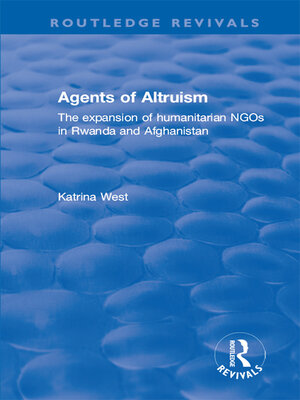Agents of Altruism
ebook ∣ The Expansion of Humanitarian NGOs in Rwanda and Afghanistan: The Expansion of Humanitarian NGOs in Rwanda and Afghanistan · Routledge Revivals
By Katrina West

Sign up to save your library
With an OverDrive account, you can save your favorite libraries for at-a-glance information about availability. Find out more about OverDrive accounts.
Find this title in Libby, the library reading app by OverDrive.



Search for a digital library with this title
Title found at these libraries:
| Library Name | Distance |
|---|---|
| Loading... |
This title was first published in 27/11/2001: Humanitarian nongovernmental organizations (NGOs) grew significantly in the last decades of the 20th century. The international NGO community today is a rich world of professional bodies, local organizations, mammoth multinationals, charities, advocacy groups, business-like organizations, ad hoc agencies and voluntary associations. Humanitarian NGOs are powerful actors in conflict regions and influential campaigners at the international level. What are the reasons behind their growth? In answering that question, this book focuses on how and when NGOs became influential in humanitarian crises. Four case studies in Rwanda and Afghanistan are examined. The earliest is the crisis in Rwanda in the 1960s, when only a few NGOs operated in Rwanda with limited budgets and experience. The second case study is the Soviet invasion of Afghanistan in 1979-89, by which time NGOs had developed considerably: by then they were operating on a global scale, receiving more funds, having closer ties with the media, executing bigger projects and had also become more professional. The second Afghan case study focuses on the mujahidin and Taliban rule, while the second Rwandan study centres on the 1994 genocide. These two studies reveal that enormous changes have taken place in the humanitarian NGO community since the 1980s. In this way, this book characterizes the changes that have taken place and then offers explanations for the nature and speed of the growth and change.







